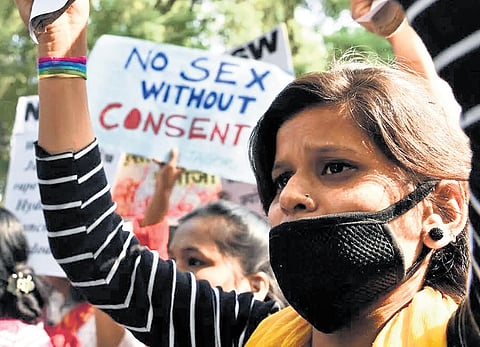The curious difference between IPC and BNS on rape
The Bharatiya Nyaya Sanhita, 2023 (BNS) has brought an important change to sexual harassment cases. Apart from changes in sanctions, one provision—Section 69—that deals with sexual intercourse by employing deceitful means particularly grabs one’s eyes. It makes a person who has had sexual intercourse through ‘deceitful means’ or by ‘making a promise to marry a woman’ without any intention of fulfilling it liable for jail of up to 10 years and a fine. ‘Deceitful means’ include inducement, false promise of employment or promotion, or suppression of identity. The offence is serious, cognisable and non-bailable.
At first look, one would certainly feel the provision was much-needed. For example, in the explosive Hema Committee report targeting predators in the Malayalam film industry, there was mention of sexual exploitation of women workers through the promise of work. Many who fell for this trap did not make it to the final cut of films, as promised.
Some issues with the provision require attention in interpretation and use. The first is regarding the use of the term ‘sexual intercourse not amounting to rape’. Before the enactment of the BNS, individuals indulging in sexual intercourse based on an alleged false promise of marriage were accused of rape under Section 375 of the Indian Penal Code. If consent was obtained on a ‘misconception of fact’, the courts did not hesitate to uphold the charge of rape, like in Anurag Soni vs Chhattisgarh. The punishment for rape cannot be less than 10 years and may extend to life imprisonment. On the other hand, a person committing an offence under BNS’s Section 69 would fall in a relatively new category of having sexual intercourse not amounting to rape and could be punished with a maximum sentence of 10 years.
Since the definition of rape continues to be largely identical in IPC and BNS, it is not clear how such an offender can still escape the charge in such cases. One may interpret the legislative intent as one to carve out a slightly different kind of offence, attracting a lesser punishment. This is because of the established law that when there is an apparent conflict between two independent provisions, be it in the same statute, the special provision must prevail (JK Cotton Spinning & Weaving Mills vs Uttar Pradesh, 1961).
The next issue is the scope for the provision’s misuse. The phrase “by making a promise to marry a woman without any intention of fulfilling the same, has sexual intercourse with her” would have to be interpreted the same way as the courts used to interpret consent obtained by misconception, though the word ‘consent’ does not feature in Section 69. So what would need to be investigated is whether the accused who made promises had the intent to honour them at the time of having intercourse and making the promise. The proof of such intent would be unravelled from the conduct and action of the accused. In cases where false promises of employment or promotion is alleged, it is even more difficult to prove the allegation to ensure conviction, but easy to register an FIR against. ‘Absence of consent’ is an essential ingredient for rape. And it is for the prosecution to establish that there is no consent.
The difference between a “false promise” and a “breach of promise” was illustrated in a recent decision of the Bombay High Court in Pramod Dhanji Purabiya vs Maharashtra. The prosecutrix, a divorcee and a mother, was acquainted with the accused, who gave her a job as a junior artist in TV serials and thereafter built up the relation with promises to marry and to look after her young son. When the woman became pregnant, the accused refused to marry her and asked her to terminate the pregnancy. When the woman refused and gave birth to the child, the accused denied paternity. On a plea of the accused to quash an FIR registered against him, the court observed that he did not intend to fulfil his promise right from the inception. It was also observed that the mere fact of renting premises for the victim did not establish intent to marry. The victim’s belief that the accused would marry him was vitiated by a ‘misconception of fact’.
Courts analyse the facts to see if an offence is made or not before deciding whether to quash it. The Supreme Court also has, on several occasions, reviewed facts relating to the false promise of marriage, including one this July in Shiv Pratap Singh Rana vs Madhya Pradesh, where the top court set aside the High Court’s decision to uphold charges of rape and criminal intimidation after noting contradictions in the prosecutrix’s statements before the police and the trial court.
It is also possible that a person, knowing fully well that the party who made a promise had no intention to fulfil it, continues to engage in a relationship and later files a complaint to coerce the person into marrying or giving employment. In cases where a false promise is alleged, it is difficult to prove the allegation in court, but easy to register an FIR.
The absence of the word ‘consent’ gives a false impression. A person having intercourse through deceitful means would obviously be doing so without consent. Therefore, even though the word ‘consent’ is absent in Section 69, it cannot be said to be irrelevant. Otherwise, it would lead to a completely absurd interpretation and increase the scope for misuse.
Ideally, this cannot be gender-specific, too—a woman can deceive a man as much as the other way. However, the language used seems to bring only men within the ambit of Section 69.
Convictions under this provision are yet to be seen and so it will take long to have an authoritative interpretation. Meanwhile, it is a valuable tool for those making genuine calls for help.
Atul N Menon
Advocate, Supreme Court of India
(Views are personal)

